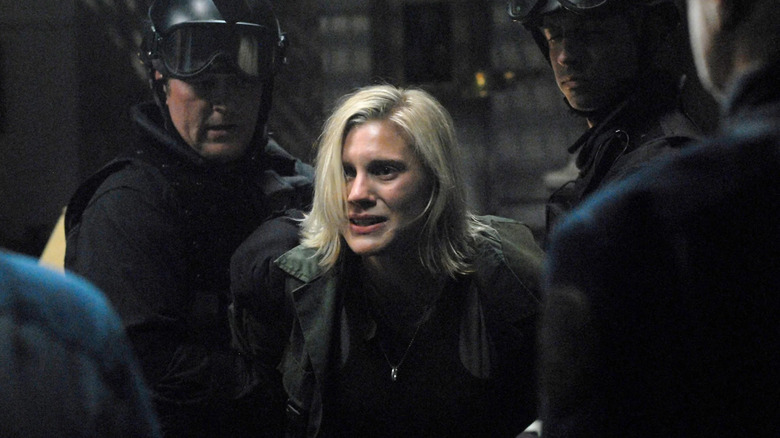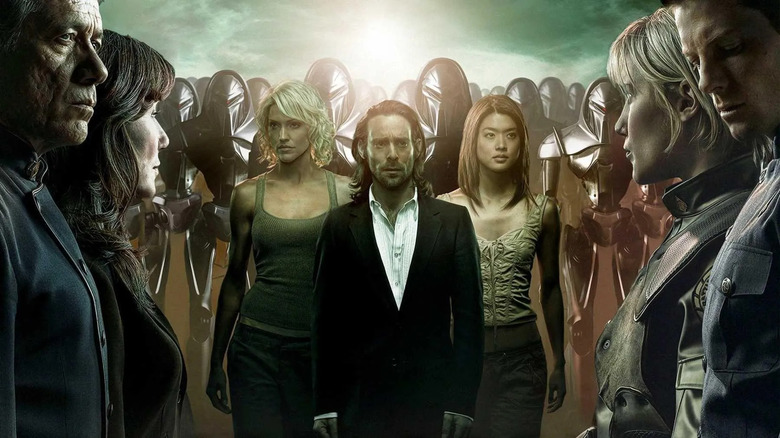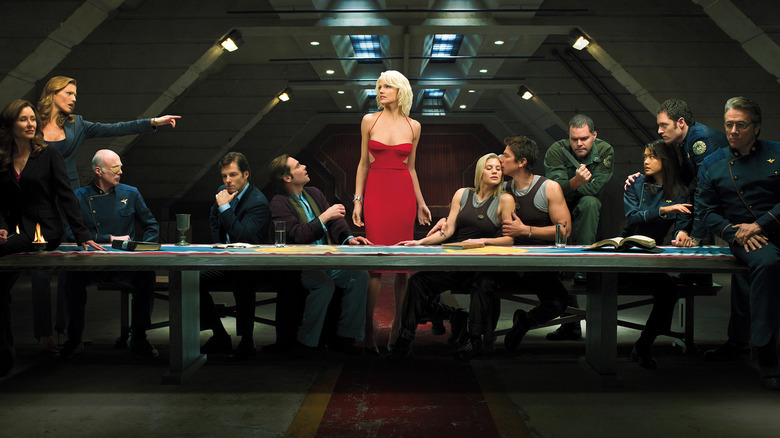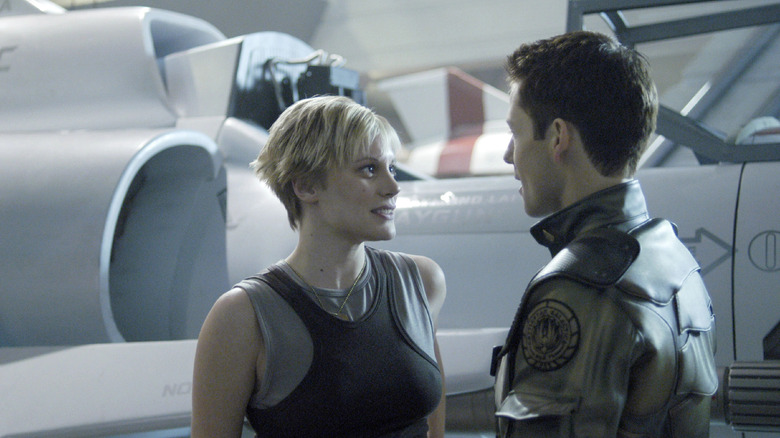The Writer's Strike Was A Blessing In Disguise For Battlestar Galactica
The 2007-2008 Writers Guild of America strike hit a lot of people hard. Writers finally got the raise they deserved, though many shows were affected. The strike lasted from November 5, 2007, through February 12, 2008, and none of the 12,000 writers in the guild were allowed to work during that time. Some shows were postponed, some had shortened seasons like "Pushing Daisies," and some were even canceled, like "The 4400" and "Bionic Woman."
The final season of "Battlestar Galactica" was being written during that time, and their staff had to pause like everyone else. Once things settled down, and the second half of the final season was about to air, creator Ronald D. Moore and executive producer David Eick did a roundtable interview about what was coming (via CinemaBlend). They were asked about how the work stoppage from the strike affected which decisions they made for the story. At this point, no one knew what was coming in terms of the controversial finale, but Moore said the strike actually helped what eventually made it to the screen.
Time to consider and rework the story
In the final season and the finale of "Battlestar Galactica" (and yes, there are spoilers ahead for a show that ended over a decade ago), the survivors of the Twelve Colonies were still fighting against the Cylon threat. Starbuck (Katee Sackhoff) was flying a mission and had another vision. She seemingly died when her viper exploded. No one stays dead in sci-fi though, and Starbuck reappeared, saying she knew how to get the colonies to a new homeland.
That homeland was our Earth, though it was 150,000 years in our past. The refugees joined the Earthlings and history developed until today. At the end, Six (Tricia Helfer) and Baltar (James Callis) walk through a modern city (all these years later) and discuss how this has happened before and it will happen again. Before that, however, Starbuck disappears after saying that this was "all part of God's plan."
A lot of fans were upset about the ending bringing too much religious symbolism into a story set in the future and full of technology. Of course, the show had been using religious imagery through all four seasons, but this was a step too far for many. Starbuck disappearing sort of took away from the idea that though many colonists were religious, it was all up to the audience's interpretation, whether or not any of that was true. It removed the implication and made it a statement that she was something otherworldly — some called her an angel or said she was resurrected to help the colonists find their new home. Whatever you thought of the final season and finale though, Moore said that the strike allowed him time to see that where the original story was headed wasn't what he wanted, and change things. It makes one wonder what could have been.
'I'm ultimately very happy that we did have that break'
Moore said that there was a lesson in here for him. He explained in the roundtable interview:
"I'd say the one thing is that I took for – took from the break from the writer's strike was that there is a need every once in a while to stop and take a breath and be sure you like where you're going. Because we had structured out the end of the show, the last 10 episodes, and had locked them in and had begun writing some drafts ... And we were working actively on them when the strike hit. But over the course of the strike it gave me a chance to pause and reflect. And think that I just wasn't satisfied with some of the directions we were going. And when the strike was over we gathered the staff together and right off the bat and said, you know what, I had some time. And I think we're making a mistake with a couple of these storylines. So let's go back and let's re-break them and re-visit them. And I was very happy for that. And, you know, maybe the lesson going forward is just, you know, just that."
He spoke about the "relentless pace" that writers are supposed to maintain. Even with a bunch of writers in a writers' room, you have to have scripts in time to shoot, and particularly for a science fiction show, you're going to need time to shoot, edit, work in effects, and to finalize everything. Getting a break is rare in the TV writing business, and sometimes when you're on a roll, you don't want to change direction or begin again.
He said of the "Battlestar Galactica" final season,
"I'm ultimately very happy that we did have that break and I did get a chance to revisit some of those ideas, and I think we have a stronger story as a result."
Did it help?
This might not be true for "Battlestar Galactica" fans though. It really does make you wonder about what story we could have seen. After many years of reflection, I dislike the ending less than I did. It still seems like a bit of a cop-out to me to have the show just say, "Oh, it was God, so that's that." (That's my quote.) I don't feel like a foundation was laid for that over the previous seasons. It always seemed to me that the religion in the show was the same as the politics. It was personal, and it was used to make points, but divine intervention wasn't a thing until now. It didn't make sense.
I dislike it less now because over the years I've come to realize that I'm not the one writing the story, and if this was Moore's vision, then this was the vision we were going to get. Do I think it could have been threaded through the show more? Sure. It still feels like a show that joked about magic and then boom, one day magic exists. I'm also not used to seeing that much religion in my sci-fi. Thinking about it again though, my headcanon says it doesn't have to have been God, despite what Starbuck says. There could be other forces at work. Collective vision, minds processing something that is too hard to work out and calling it God, that sort of thing. In the end, each viewer will take it the way they take it. Still, I want to see those earlier ideas, just for fun.



